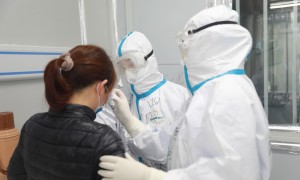In afternoons, 35-year-old Markos walks his dog in the quiet woods on Mount Lycabettus, overlooking Athens. But he's not in the mood to enjoy the tranquility or the leisure.
All this free time belongs to retired people like his parents, he said. "The problem is that when you get up every day, you don't have something to do."
Markos, who didn't want to be fully identified, was laid off in March by the government-owned Olympic company, which has airline, tourism, real estate and other operations.
He now lives with his parents, and the government pays him 460 euros ($600) in unemployment allowance each month, although that will run out in March.
Because he speaks fluent English and has experience in tourism promotion, Markos had expected no problems in landing a new job. However, since the debt crisis erupted in May 2010, the government has cut public-sector jobs, as well as salary and social welfare payments.
Meanwhile, uncertainty, panic and pessimism have dominated the country, and investors are not willing to risk opening new businesses. "So finding a job is extremely hard," Markos said.
With the economy shrinking for a fourth consecutive year, the young continue to be the hardest hit. More than four of every 10 people ages 18-25 are out of work.
And their situation is likely to be even worse next year. Both the European union (EU) and the International Monetary Fund (IMF) have forecast that Greece's economic freefall won't end before 2013.
Not every Greek has responded to the tough times as quietly as Markos, who thinks the new coalition government led by Lucas Papademos will give Greece a new chance. many others have joined streams of demonstrations.
General strikes in October shut down services across the country for two days, and the trade union s are planning a 24-hour general strike on Thursday to protest next year's austerity budget. It will be the first major walkout since the appointment of the interim coalition government in early November.
Over the past two years, Greeks have held dozens of strikes and demonstrations against the repeated rounds of salary cuts and tax increases. All the pain and hardship have also pushed them to heatedly debate whether to stay in the eurozone.
'Alarming worries'
"This is a decision our country should make soon," Kosta Makrhs said last week as students marched to the lower end of Syntagma Square, the plaza facing the Greek parliament.
Makrhs, who has daughters 16 and 9, and his cousin Angflo Drakos don't want to miss any protest, but they are not participants. With a shabby stall a block from the square, they sell bread to the protesters. "Not so many people come to buy, but demonstrations are walking fairs for us," says Makrhs, who can earn 25 cents for each piece of bread he sells at 50 cents.
Makrhs used to wait tables in a restaurant, but he lost his job last year when bleak business forced it to close. His wife still works in a furniture factory in Athens and earns about 1,100 euros a month. With his tiny income from selling bread, the family can barely make ends meet.
"There are many alarming worries in my country," Makrhs said. He is most concerned about the growing numbers of homeless and hungry people who roam the streets and the rising count of drug addicts and suicides.
According to official data cited by the Guardian newspaper in the United Kingdom, 5,000 suicides in Greece were reported in the first eight months this year, compared with 2,500 for all of last year. Idle people roam the streets of downtown Athens, and theft and robbery are rampant. Police and security guards are patrolling, but often are seen to continue their chatting and smoking after hearing a robbery call.
"These are alarming phenomena," Makrhs said.
Meanwhile, he said, the children have been severely affected by the austerity measures. For example, the salary of teachers at his daughters' school was reduced by half to 600 euros a month, and now the teachers don't show up sometimes. Textbooks used to be free; now there is a charge. And if his children get sick, he said, they must wait a month for treatment because the hospitals don't have enough hands.
"The government should correct these as quickly as possible," Makrhs said. Otherwise, he said, poor education will not prepare them to compete as adults in a world economy.







